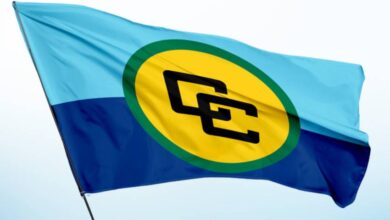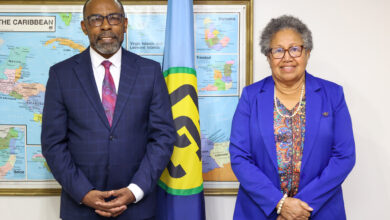(CARICOM Secretariat, Turkeyen, Greater Georgetown, Guyana) This is a great pleasure for me, both as the representative of the European Union, a development partner to CARIFORUM and as a strong believer in Regional Integration as an instrument towards achieving sustainable economic development, to be here today.
Indeed, we are about to sign three Financing Agreements for three important programmes which were identified and developed jointly, based on the Region priorities.
In financial terms, this concretely means that the European Union is today providing a total of € 82.6 M [approximately US$110M] to the Caribbean Forum of the ACP States – CARIFORUM – with the main objective to assist the Region, both at the CARICOM and OECS level, in its integration efforts.
These funds are coming from the € 165 M Regional Programme of the 10th European Development Fund (EDF). They are a testimony of the EU’s continued commitments to support the Caribbean Region in the dynamic process of regional integration and signal another milestone in the longstanding relation between the Caribbean Forum of ACP States and the European Union.
Generally, the reasons beyond the engagement of countries into regional integration are motivated by the interplay of political and economic arguments.
On the EU side, the first main force which has triggered the Regional Integration in Europe over fifty years ago was a political one, i.e. the wish to secure the future of Europe away from war conflicts and to be part of a peace building efforts with the creation of the European Community for Coal and Steal.
In the Caribbean, and according to some research documents, the goal of regional integration appears to have emerged as a tool for political independence, and so the West Indian Federation was established in 1958. Behind that motivation, there was also the economic argument according to which because of their small sizes, the Caribbean Islands could not be economically viable on their own.
The path to full integration is a long and dynamic process, not deprived of obstacles. The European Union was not made all at once, or according to a single plan but rather it has been built through concrete achievements which created solidarity. As such The EU has been supporting the integration steps of CARICOM along this process.
The three programmes being signed today are:
The “CSME and Economic Integration Programme” – € 27.5M. This Programme will ensure continuity with the ongoing support the EU is providing under the 9th European Development Fund to support among others the reform process needed to bring the CARICOM Member States in compliance with the provision of the Revised Treaty of Chaguaramas establishing the CSME. In particular, this support will: • Assist the CARICOM Secretariat with the further implementation of its CSME Work Programme; • Provide specific support to Haiti and Belize, two countries lagging behind the CSME process; • Address the lack of implementation at the national level, assistance to Member States will be secured. For the latter purpose, €3.45M will be provided and will be managed by the Caribbean Development Bank.
The “OECS Economic Integration and Trade of the OECS”: €Mio 8.6 The EU recognizes the OECS as an independent regional integration movement and fully supports its Economic Union integration process enshrined in the Revised Treaty of Basseterre Establishing the OECS Economic Union, signed on June 18, 2010.
This is why this second programme will provide direct support to the Organization by contributing to its economic integration and trade. €8.6 M will go towards the implementation of harmonized development policies in the tourism and agriculture sectors, the enhancement of the competitiveness and export capacity of the OECS private sector, and a regional network of excellence in the tourism and hospitality education sector
EU support to the OECS has been ongoing as the OECS has benefited from the 9th EDF Caribbean Integration Support Programme (CISP), in such areas as market integration, institutional development, public education and training. This programme primarily assisted OECS countries in their compliance with their CSME commitments and obligations.
The Programme “Support the Forum of Caribbean States in the implementation of the commitments undertaken under the Economic Partnership Agreement”: € 46.5 M. This programme corresponds to the commitment of the EU, when signing the Economic Partnership Agreement, to support the region with its implementation. A total of € 46.5M aiming at providing tools to strengthen CARIFORUM Member states capacity to implement and benefit from the opportunities created by the EPA. This programme provides: • Technical support in common areas where weaknesses, in varying degrees, have been identified and which are critical to the development of the economies. • These areas include Fiscal Reform and Adjustment; Statistics; Sanitary and Phyto-Sanitary Measures (SPS); Technical Barriers to Trade (TBT); Services; Rum Sector. • Institutional support to CARIFORUM is included, to provide support to CARIFORUM member states through a Facility to be managed by the Caribbean Development Bank.
The signature of these agreements now means that CARIFORUM has to quickly move into the implementation phase, together with the identified implementing partners.
This involves as the next step the completion of the contractual implementing arrangements for each programme.
This includes as well, as part of aid effectiveness, coordination with other donors involved in supporting the Region in similar areas.
All eyes will now be focused in their direction for the timely delivery of these programmes.
I wish CARIFORUM every success and look forward to the expected positive achievements of these programmes for the Region.
Thank you.




